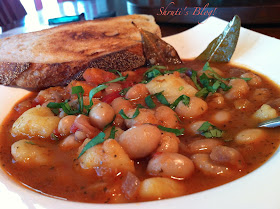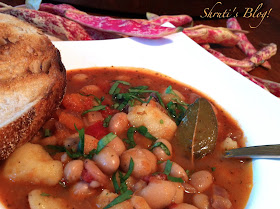Vegetable Upma
Some years ago, Gits Foods ran a TV ad where upma he makes from a pack teleports a homesick young boy to his mother’s lap screaming “Upmaaaaaaa!”
I don’t remember more details – but the ad made an impact and stayed in the minds of viewers. Why wouldn’t it – it had clever copy, unlimited ad budgets, and upmarket creatives…
The emotive value of the word upma was milked so effectively. The word evokes everyday chow, a dish made by mother “with her own hands” (how else does one make it?) It denotes food that is within the realm, comfort, parlance and reach of everyday life. Food which anyone can access – at home, in trains and at State Transport bus stops, in college canteens, on flights (Singapore Airlines – this is a dig at you!) roadside shacks, five-star hotels in India and overseas as well. Yes, there is nothing more heartening on long business trip than to get hot upma for breakfast in the hotel in Macati City or Busan.
A popular breakfast “item” (BTW - why is it called item?) upma literally means salty, savoury dough. It is also called uppittu, uppit or tikhatmithacha sanja (तिखट मिठाचा सांजा) in various languages and is a cousin of the Polenta.
Upma is relished at all times as tiffin or snack. But at home, we often have it as meal for brunch or dinner. An addition of vegetables makes it wholesome and a complete meal.
It also earns it names like tomato rava bath and khara bath… (giggle, giggle - at this point I have visions of the Tomatina Festival in Spain…)

Vegetable Upma
Ingredients
1½ cups mixed vegetables cut to similar size pieces(carrot, green beans, potatoes)
¼ cup green peas
1 ½ cups coarse semolina (rawa/suji)
1 medium onion, chopped
1 medium tomato, chopped
1 tsp lemon juice(optional)
1 tsp sugar/sweetener (optional, but trust me, this lifts the upma!)
3-4 tbsps oil
½ tsp mustard seeds
10-12 curry leaves
1 tsp split skinless urad dal
2-3 green chillies, chopped (or more)
1 tbsp minced ginger (or less)
Salt to taste
Chopped coriander and grated coconut to garnish.
Method
Boil 3-4 cups water in a pan, or just set the kettle on, as I do. Blanch all the vegetables, or microwave them for 3-4 minutes, as I do.
Heat a pan and add the oil. Add mustard seeds and urad dal and mind the tadka as the seeds splutter and the dal browns. Take care not to burn! Add curry leaves chillies and sauté for a few seconds. Add onion and ginger and sauté for 2 minutes. When the onion starts to brown, add tomatoes. As soon as the tomatoes start to let the sauce out, add the semolina and sauté for 2-3 minutes till the semolina gets coated with the oil and sauce. Add carrot, potatoes, beans, peas and mix and sauté for a minute or so. Then pour about 3 cups of boiling water gradually, stirring the mixture constantly so that no lumps form. Add a little extra, if you like the upma soft. Add the sugar/sweetener and salt to taste. Squeeze the lemon juice in.
Cover and cook for a few minutes. When you white steam emanating from the pan, uncover and mix again, adjusting the consistency with some more water. Cover again and cook for a minute or two. Remove from heat and allow to stand covered for 5-7 minutes. Serve hot, garnished with chopped coriander and grated coconut.
You can also serve this with coconut chutney and sambar. Or with some sugar – yes, I am serious!!
Some years ago, Gits Foods ran a TV ad where upma he makes from a pack teleports a homesick young boy to his mother’s lap screaming “Upmaaaaaaa!”
I don’t remember more details – but the ad made an impact and stayed in the minds of viewers. Why wouldn’t it – it had clever copy, unlimited ad budgets, and upmarket creatives…
The emotive value of the word upma was milked so effectively. The word evokes everyday chow, a dish made by mother “with her own hands” (how else does one make it?) It denotes food that is within the realm, comfort, parlance and reach of everyday life. Food which anyone can access – at home, in trains and at State Transport bus stops, in college canteens, on flights (Singapore Airlines – this is a dig at you!) roadside shacks, five-star hotels in India and overseas as well. Yes, there is nothing more heartening on long business trip than to get hot upma for breakfast in the hotel in Macati City or Busan.
A popular breakfast “item” (BTW - why is it called item?) upma literally means salty, savoury dough. It is also called uppittu, uppit or tikhatmithacha sanja (तिखट मिठाचा सांजा) in various languages and is a cousin of the Polenta.
Upma is relished at all times as tiffin or snack. But at home, we often have it as meal for brunch or dinner. An addition of vegetables makes it wholesome and a complete meal.
It also earns it names like tomato rava bath and khara bath… (giggle, giggle - at this point I have visions of the Tomatina Festival in Spain…)

Vegetable Upma
Ingredients
1½ cups mixed vegetables cut to similar size pieces(carrot, green beans, potatoes)
¼ cup green peas
1 ½ cups coarse semolina (rawa/suji)
1 medium onion, chopped
1 medium tomato, chopped
1 tsp lemon juice(optional)
1 tsp sugar/sweetener (optional, but trust me, this lifts the upma!)
3-4 tbsps oil
½ tsp mustard seeds
10-12 curry leaves
1 tsp split skinless urad dal
2-3 green chillies, chopped (or more)
1 tbsp minced ginger (or less)
Salt to taste
Chopped coriander and grated coconut to garnish.
Method
Boil 3-4 cups water in a pan, or just set the kettle on, as I do. Blanch all the vegetables, or microwave them for 3-4 minutes, as I do.
Heat a pan and add the oil. Add mustard seeds and urad dal and mind the tadka as the seeds splutter and the dal browns. Take care not to burn! Add curry leaves chillies and sauté for a few seconds. Add onion and ginger and sauté for 2 minutes. When the onion starts to brown, add tomatoes. As soon as the tomatoes start to let the sauce out, add the semolina and sauté for 2-3 minutes till the semolina gets coated with the oil and sauce. Add carrot, potatoes, beans, peas and mix and sauté for a minute or so. Then pour about 3 cups of boiling water gradually, stirring the mixture constantly so that no lumps form. Add a little extra, if you like the upma soft. Add the sugar/sweetener and salt to taste. Squeeze the lemon juice in.
Cover and cook for a few minutes. When you white steam emanating from the pan, uncover and mix again, adjusting the consistency with some more water. Cover again and cook for a minute or two. Remove from heat and allow to stand covered for 5-7 minutes. Serve hot, garnished with chopped coriander and grated coconut.
You can also serve this with coconut chutney and sambar. Or with some sugar – yes, I am serious!!












